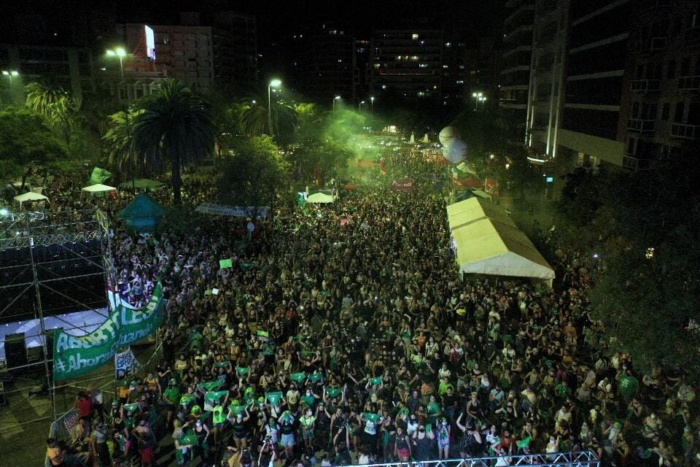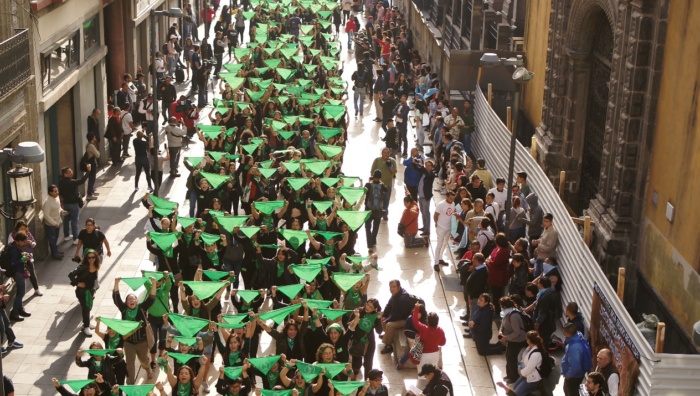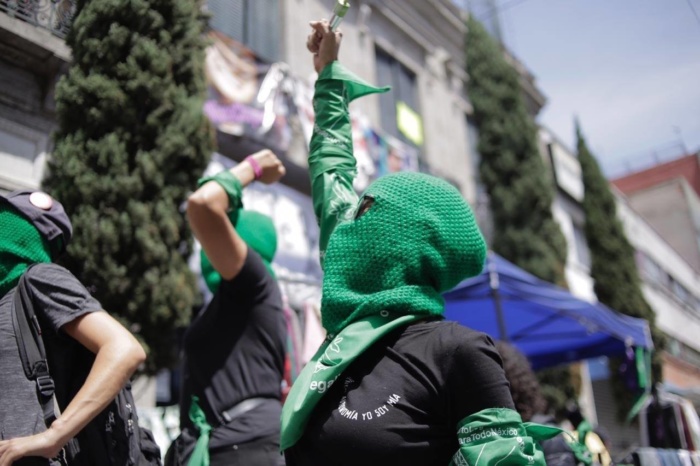Rosie Thornton looks back at the recent history of collective struggle towards the right to abortion in Argentina, she notes the alternative ‘Light Blue Wave’ gaining momentum, and looks forward to what the future of reproductive health may look like in Argentina and other Latin American countries.
Feminist groups in Argentina and abroad greeted the New Year in celebration as the country’s National Congress voted in favour of the Voluntary Interruption of Pregnancy Bill, which will allow childbearing people in the country to access abortion for free in public hospitals up to the 14th week of pregnancy.
A victory decades in the making
Before Argentina voted on 30th December to join their neighbour, Uruguay, in allowing access to abortion on demand, it was only permitted if it would save the life of the mother, or if continuing with the pregnancy would jeopardise her physical health. Before the landmark ruling, the situation was very dire for people who found themselves bearing an unwanted pregnancy. This has had devastating consequences: Amnesty International estimates that girls aged between 10 and 14 give birth every three hours in Argentina. Meanwhile the National Campaign for Legal, Safe and Free Abortion calculates that around 500 million people seek clandestine abortions each year, resulting in more than 3,000 deaths since the country became a democracy in 1983.
The objectives of the National Campaign for Legal, Safe and Free Abortion are to bring debate around the necessity of decriminalising and legalising abortion into the public and political consciousness, to encourage more women and human rights organisations to get involved, and to bring the debate into Congress with a view to getting approval on a legal standard that decriminalises abortion in Argentina.
As the use of the scarf recalls an act of resistance against Argentina’s ultra-conservative, dictatorial past, this ruling marks an important break from decades of patriarchal control.
In 2019, the world was horrified by the story of an eleven-year-old girl who was admitted to hospital in the north-western province of Tucumán. It was discovered that she was 19 weeks pregnant, bearing the child of her grandmother’s partner who had raped her. Although the law at the time stated that abortion was permissible in cases of rape or when the mother or child’s life was in danger, the health authorities in the province refused to grant her and her mother’s request for an abortion. They employed delay tactics, effectively forcing the girl to continue the pregnancy to term until she had to undergo an emergency cesarean, which resulted in severe health problems for her.
Mariela Belski, executive director of Amnesty International Argentina, said of the case: ‘This appalling case is symptomatic of the Argentine authorities’ systemic violation of girls’ [and] women’s sexual and reproductive rights, silencing their voices and negating their autonomy. Time and time again we are seeing these basic rights denied across Argentina, even when they are explicitly protected under national laws.’
Incidentally, a key point of the new law stipulates that any public official or health worker who obstructs or refuses to perform an abortion in legally authorised cases may be disqualified from practice and may be criminally sanctioned.

The pañuelo verde
The most striking visual representation of the contemporary campaign for reproductive rights has been the green scarf: the item worn and carried by campaigners and street demonstrators. This collection of activists is also known as the Green Wave, now a byword for the Campaign for Reproductive Rights that not only has taken Argentina by storm, but is also spreading throughout Latin America.
The use of a green scarf recalls the white headscarves worn by mothers and grandmothers as they gathered on the Plaza del Mayo in Buenos Aires during the years of the dictatorship, demanding that the regime give them answers as to the disappearances of their sons and daughters. As the use of the scarf recalls an act of resistance against Argentina’s ultra-conservative, dictatorial past, this ruling marks an important break from decades of patriarchal control.
LAB spoke to an activist named Ruth from La Revuelta Colectiva Feminista:
‘The Voluntary Interruption of Pregnancy Bill that we obtained by vote on 30
December in the country’s senate chamber is the most collectively fought for bill. It’s the result of years and years of feminist persistence, and insistence, and the construction of innumerable alliances. And these alliances came together to form the Green Wave. This immense process of activism reunited so many intergenerational movements who are familiar with these struggles.’
The Light Blue Wave
Of course, such a radical change in the politics of a devout Catholic country has provoked a backlash. In response to the vote, and the success of the Green Wave movement, ‘Pro Life’ activist Connie Pallito created the Instagram page ‘Pro Life Youth’, to promote the “Light Blue Wave“, including the wearing of light blue ribbons and scarves.
Pallito claims the movement does not take aim at women seeking abortion, but against social inequality that might make them afraid to bring up a child in poverty:
‘We’re conscious that abortion happens. We are not against the woman who gets an
abortion, but against the system that makes her believe abortion is her only solution.’ Along with social media campaigns headed by young activists like Pallito, there have been street demonstrations supported not only by the Catholic Church but also by Evangelical and civil-society groups, gathering in cities such as Córdoba and Buenos Aires throughout November.

The presence of Evangelicals at ‘Pro Life’ protests is notable. Although 62% of the
population is Catholic, the 15.3% of the population who identify as Evangelical has become prominent in anti-abortion activism. The Evangelical church in Argentina has links with its equivalent in the United States. US Evangelical groups such as The Billy Graham Evangelistic Society, Focus on the Family and the Population Research Institute have collectively spent millions of dollars pushing an anti-abortion, anti-LGBTQ, anti-sex education agenda in Latin American countries, mostly though disseminating their literature, translated into Spanish. The Population Research Institute in particular, although it has only spent $1 million in the region in the last 10 years, has planned March for Life demonstrations in Argentina, Chile, Colombia and Peru.
US Evangelical groups […] have collectively spent millions of dollars pushing an anti-abortion, anti-LGBTQ, anti-sex education agenda in Latin American countries, mostly though disseminating their literature, translated into Spanish.
According to Ruth, there is little threat that Pro Life groups will reverse the ruling: ‘I don’t realistically see them encountering in the justice system the possibility of stopping the decriminalisation and the legislation that they look for.’ She says that self-described ‘conscientious objectors’ to the law might attempt to avoid granting abortions on an individual basis, although they would be legally prohibited from obstructing a person seeking an abortion from accessing the service:
‘For example: if a person turns up looking for an abortion … the response the objector can give is: “I cannot give consent to this practice because I am an objector but you can come and see this other doctor tomorrow in their office and then you can look for an appointment.” There can be no violations, there can be no obstructions, so part of our work might be to show that there is a difference between objecting to the practice and obstructing it. We have to avoid creating any obstruction to the practice because then it becomes the obstruction of a right, and the law does not permit that.’
The Green Wave spreads
Ruth tells us that the focus of reproductive rights campaigners will be to ensure not only that the law is implemented throughout the health system, but also that sex education includes information about abortion. It’s of utmost importance that all sectors of the population are informed about their rights:
‘As well as promoting the law in the big cities, it must also be known about in small localities, far away from urban centres, so that not a single person is forced to continue a pregnancy because they don’t have knowledge of the existence of the law. It’s part of the work that we will undertake in the very near future.’
This grassroots form of popular education is also employed by the organisation Las
Casildas, a feminist organisation that seeks to increase the visibility of difficult topics such as obstetric and gender violence, and to educate parents on sexual and reproductive rights through watchdogs, theatre productions, consultations and neonatal classes. Las Casildas aim to bring mothers together to share their experiences, create a network linking communities with the healthcare system, and share information, providing the tools necessary for making informed decisions and allowing childbirth to be a more positive and empowering experience for families.
Despite this breakthrough for reproductive rights in Argentina, more than 97% of people of reproductive age in Latin America and the Caribbean live in countries with restrictive abortion laws. While Argentina has now joined Cuba, Guyana, Puerto Rico and Uruguay in granting access to abortion on demand, many countries such as Brazil, Chile, Mexico, Peru and Colombia only permit it to save the life of the mother, or to preserve physical or mental health.
Meanwhile in the Dominican Republic, El Salvador, Haiti, Honduras, Nicaragua and Suriname, abortion is prohibited under any circumstances. Cindy Erazo, a 29-year-old Salvadoran woman, was sentenced to 30 years in prison after being accused of trying to end her pregnancy when she had a stillbirth at eight months. Cindy was released from prison a year after her conviction, after campaigning by women’s rights groups. However, more than 18 women are thought to be in prison for abortion-related crimes in the country.
While the ruling in Argentina has given fresh confidence and motivation to sister Green Wave movements in countries such as Chile, Mexico and Peru, the right to abortion remains fiercely opposed not only by the Catholic Church, but also by a growing US-backed Evangelical Church.


Main image: Activists celebrate the ruling on December 30, 2020. Photo: Campaña Nacional por el Derecho al Aborto Legal, Seguro y Gratuito.

